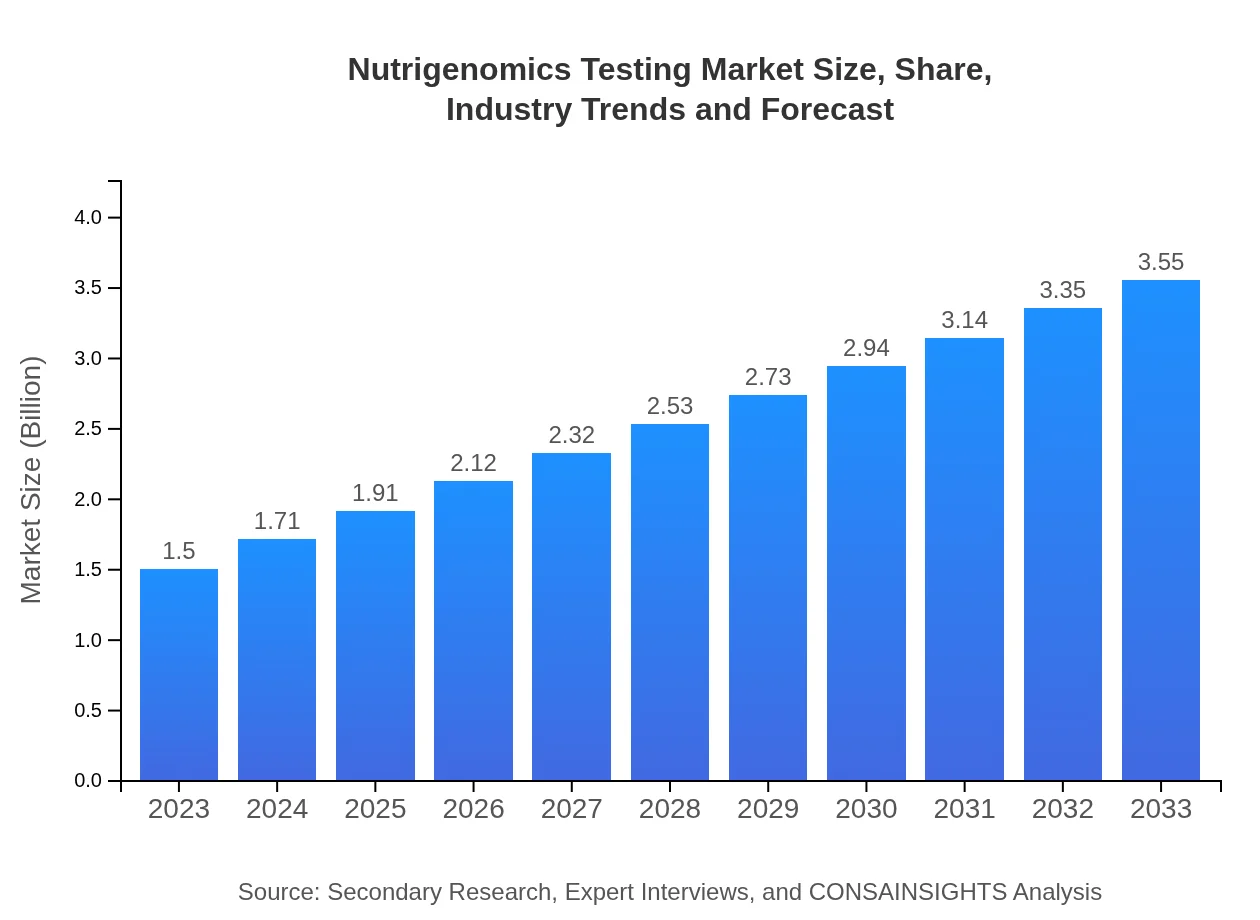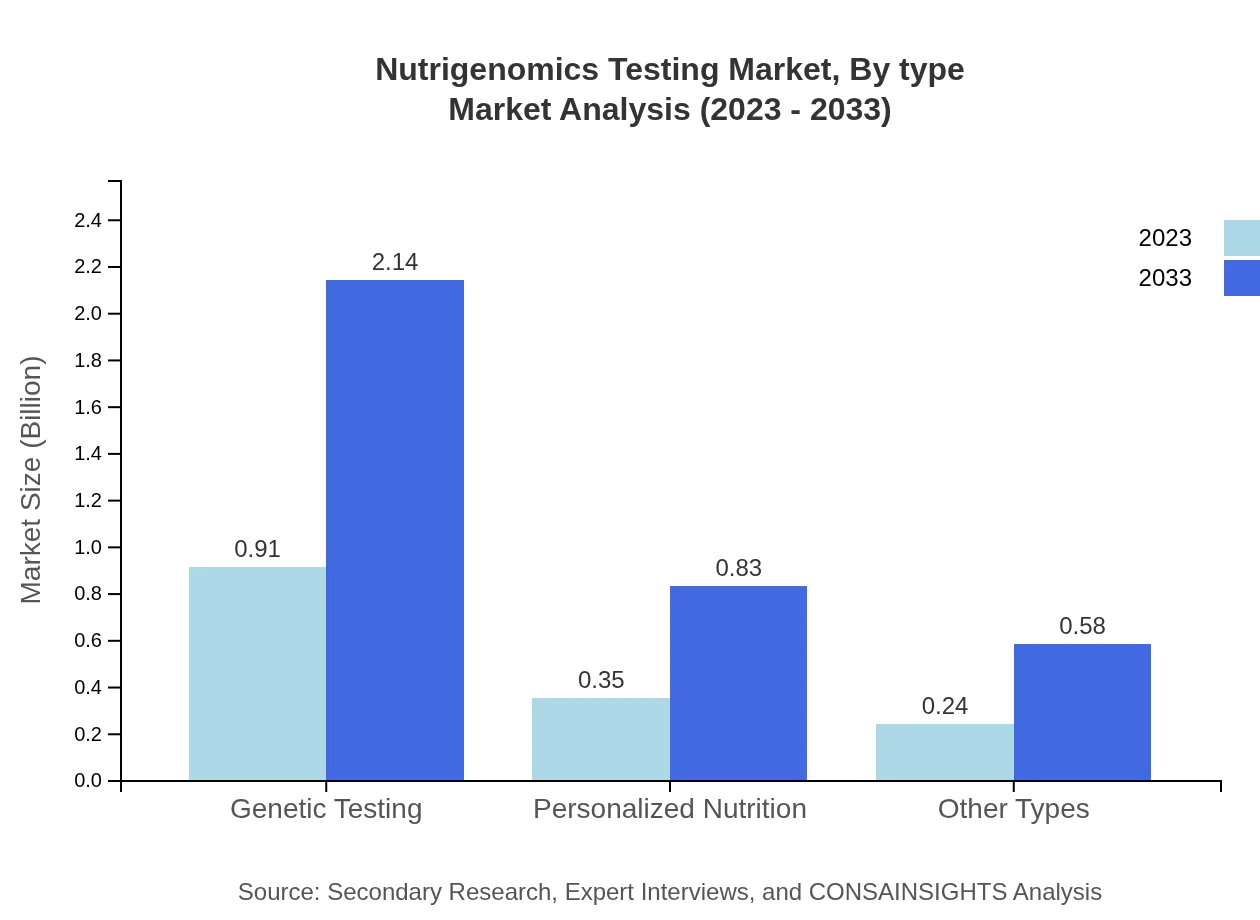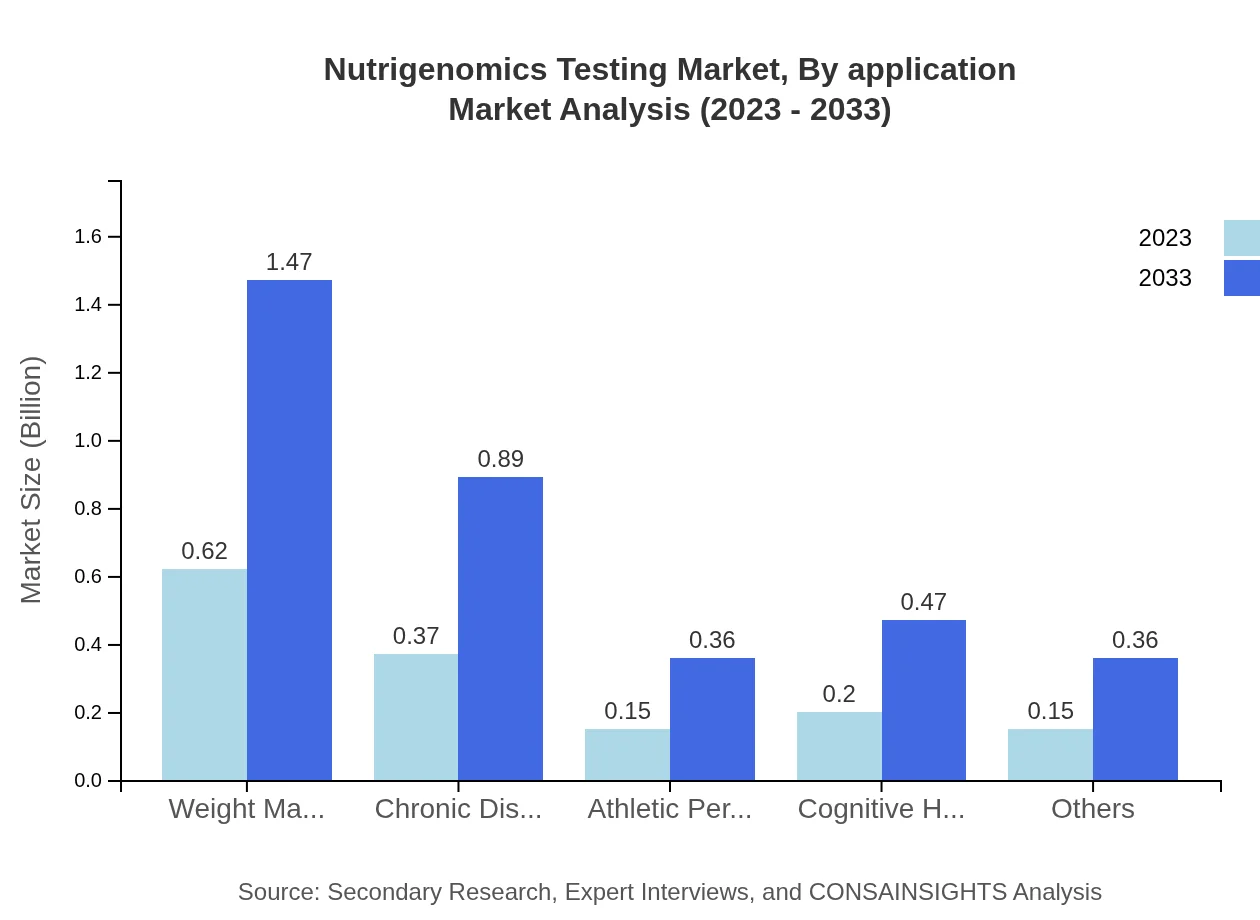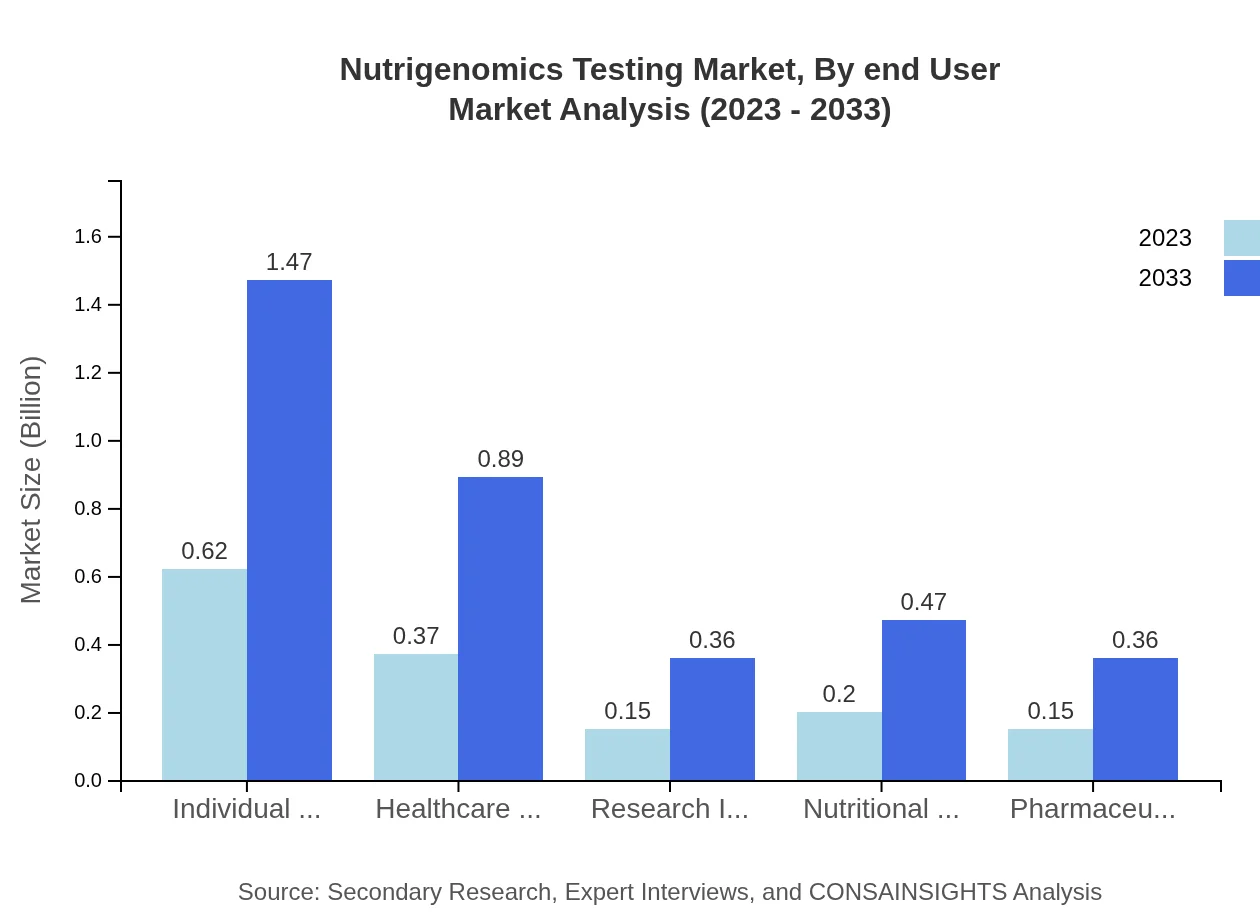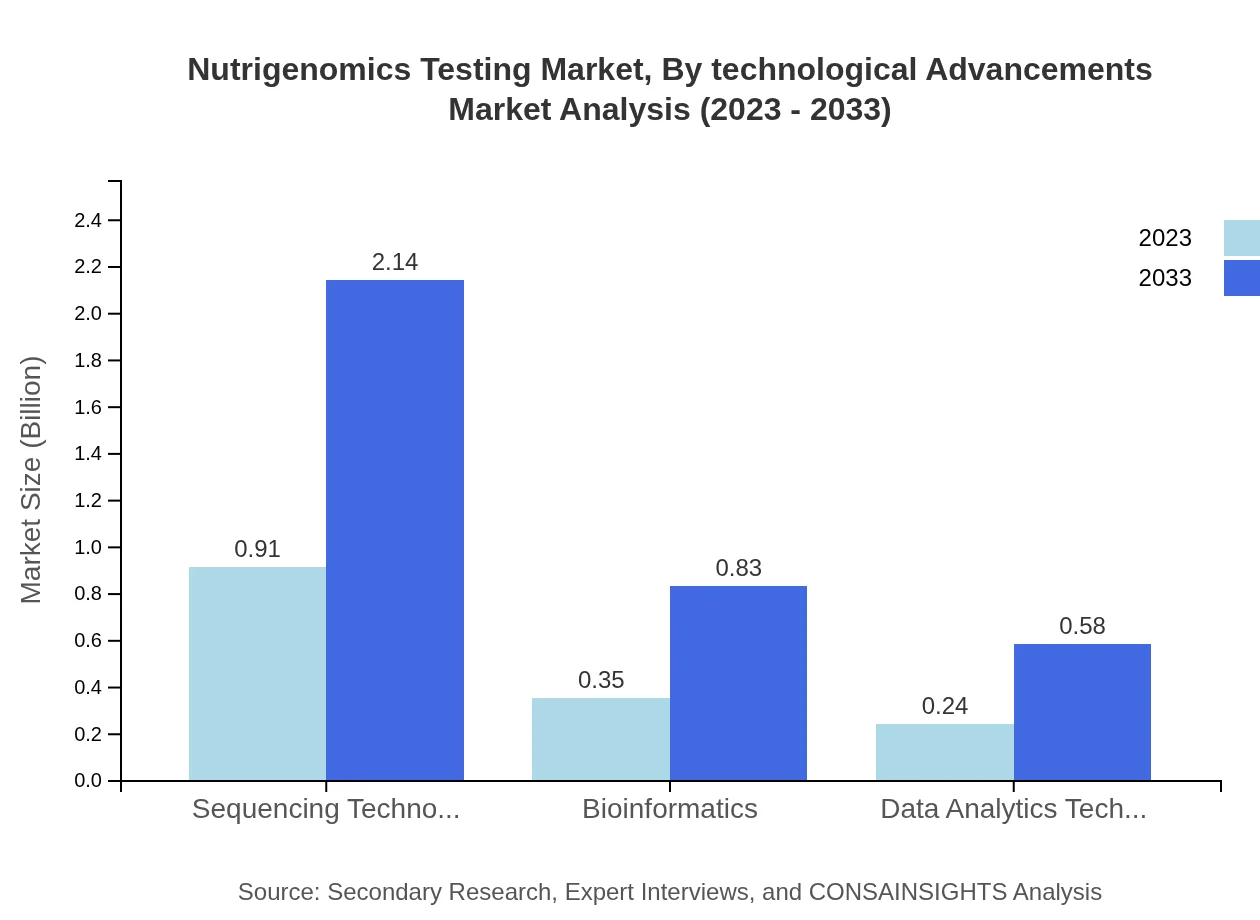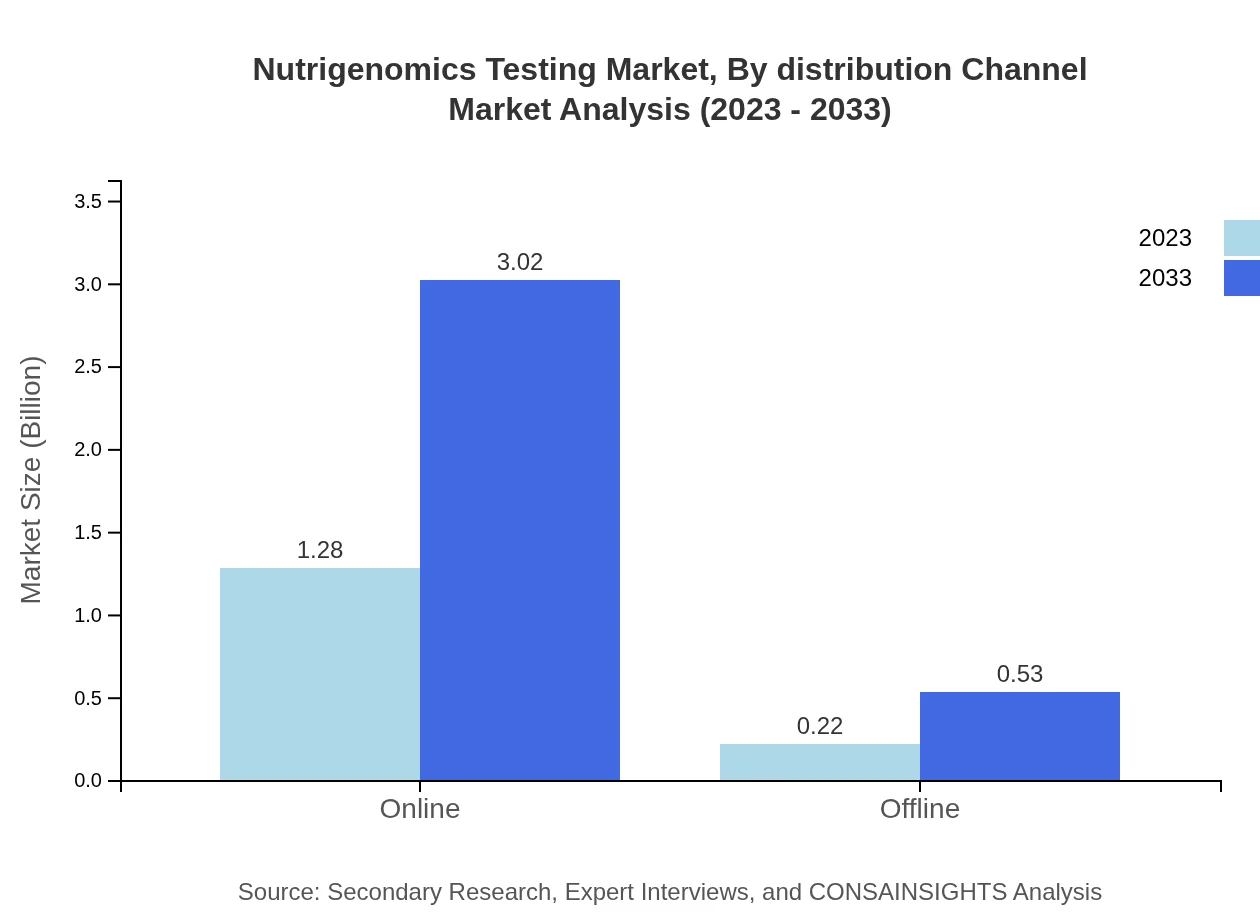Nutrigenomics Testing Market Report
Published Date: 31 January 2026 | Report Code: nutrigenomics-testing
Nutrigenomics Testing Market Size, Share, Industry Trends and Forecast to 2033
This report covers the comprehensive analysis of the Nutrigenomics Testing market from 2023 to 2033, providing insights on market size, trends, segmentation, regional analysis, and future forecasts.
| Metric | Value |
|---|---|
| Study Period | 2023 - 2033 |
| 2023 Market Size | $1.50 Billion |
| CAGR (2023-2033) | 8.7% |
| 2033 Market Size | $3.55 Billion |
| Top Companies | 23andMe, Genomatix, Nutrigenomix, DNAfit |
| Last Modified Date | 31 January 2026 |
Nutrigenomics Testing Market Overview
Customize Nutrigenomics Testing Market Report market research report
- ✔ Get in-depth analysis of Nutrigenomics Testing market size, growth, and forecasts.
- ✔ Understand Nutrigenomics Testing's regional dynamics and industry-specific trends.
- ✔ Identify potential applications, end-user demand, and growth segments in Nutrigenomics Testing
What is the Market Size & CAGR of Nutrigenomics Testing market in 2023?
Nutrigenomics Testing Industry Analysis
Nutrigenomics Testing Market Segmentation and Scope
Tell us your focus area and get a customized research report.
Nutrigenomics Testing Market Analysis Report by Region
Europe Nutrigenomics Testing Market Report:
Europe's market is estimated to increase from $0.43 billion in 2023 to $1.01 billion by 2033. The region is characterized by strong regulatory support and a growing trend towards preventive health management.Asia Pacific Nutrigenomics Testing Market Report:
In the Asia Pacific region, the market is projected to increase from $0.28 billion in 2023 to $0.66 billion in 2033. Growth is driven by rising health consciousness and increasing investments in healthcare infrastructure, particularly in countries like China and India.North America Nutrigenomics Testing Market Report:
North America holds a significant share of the market, projected to grow from $0.57 billion in 2023 to $1.35 billion in 2033, thanks to advanced healthcare systems and high consumer awareness about personalized nutrition.South America Nutrigenomics Testing Market Report:
The South American market is expected to expand from $0.04 billion in 2023 to $0.09 billion by 2033, with Brazil leading the growth due to an increase in health and wellness trends among consumers.Middle East & Africa Nutrigenomics Testing Market Report:
In the Middle East and Africa, the Nutrigenomics Testing market is forecasted to grow from $0.18 billion in 2023 to $0.43 billion in 2033. Increasing urbanization and rising disposable incomes are anticipated to boost health-related expenditures in these regions.Tell us your focus area and get a customized research report.
Nutrigenomics Testing Market Analysis By Type
The market analysis by type reveals that Genetic Testing leads in size, starting from $0.91 billion in 2023 and expected to reach $2.14 billion by 2033, maintaining a significant market share. Personalized Nutrition, worth $0.35 billion in 2023, is projected to grow to $0.83 billion, showcasing the shift towards tailored dietary solutions.
Nutrigenomics Testing Market Analysis By Application
When categorized by application, Weight Management and Chronic Disease Prevention hold substantial shares, each initially at 41.53% and 24.99% respectively in 2023. As consumer awareness grows, these applications are expected to gain more traction, reflecting an increasing focus on health optimization.
Nutrigenomics Testing Market Analysis By End User
The end-user segment is diverse, with Individual Customers owning 41.53% of the market share in 2023. Healthcare Providers (24.99%) and Research Institutions (10.18%) also play pivotal roles in market dynamics, reflecting a balanced emphasis on personalized health interventions.
Nutrigenomics Testing Market Analysis By Technological Advancements
Technological advancements in sequencing technology are critical, representing $0.91 billion in 2023 and anticipating a rise to $2.14 billion. Bioinformatics and data analytics also showcase significant growth, facilitating improved testing methodologies and comprehensive analysis of genetic data.
Nutrigenomics Testing Market Analysis By Distribution Channel
Distribution channels indicate a strong preference for online sales, commanding 85.21% of the market share. Online platforms are dominant, accounting for $1.28 billion in 2023 and expanding to $3.02 billion by 2033, validating consumer trends towards convenient access to nutrigenomic tests.
Nutrigenomics Testing Market Trends and Future Forecast
Tell us your focus area and get a customized research report.
Global Market Leaders and Top Companies in Nutrigenomics Testing Industry
23andMe:
23andMe is a pioneer in personalized genetics, providing customers with insights about their health and ancestry through direct-to-consumer genetic testing.Genomatix:
Genomatix specializes in bioinformatics and genomic data analysis, offering solutions that integrate genetics with nutrition for personalized health recommendations.Nutrigenomix:
Nutrigenomix offers genetic testing services to healthcare professionals and their clients, providing personalized nutrition assessments based on genetic markers.DNAfit:
DNAfit focuses on personalized fitness and nutrition programs, helping individuals optimize their health through genetic testing insights.We're grateful to work with incredible clients.









FAQs
What is the market size of nutrigenomics testing?
The nutrigenomics testing market is expected to reach a size of approximately $1.5 billion by 2033, growing at a CAGR of 8.7%. This growth reflects a rising awareness of personalized nutrition and its health benefits across diverse populations.
What are the key market players or companies in the nutrigenomics testing industry?
Key players in the nutrigenomics testing market include companies specializing in genetic testing and personalized nutrition. Major firms often focus on innovative testing methodologies and expanding their service offerings to cater to the growing demand for customized dietary recommendations.
What are the primary factors driving the growth in the nutrigenomics testing industry?
Growth in the nutrigenomics testing industry is primarily driven by increased awareness of genetic predispositions to diseases, advances in genetic testing technologies, and a rising demand for personalized nutrition solutions among consumers seeking optimal health and wellness.
Which region is the fastest Growing in the nutrigenomics testing market?
North America is currently the fastest-growing region in the nutrigenomics testing market, projected to grow from $0.57 billion in 2023 to $1.35 billion by 2033, driven by technological advancements and a strong focus on health and nutrition.
Does ConsaInsights provide customized market report data for the nutrigenomics testing industry?
Yes, ConsaInsights offers customized market report data specific to the nutrigenomics testing industry, allowing clients to tailor their research needs based on geographical, segment-specific, and temporal data to maximize strategic insights.
What deliverables can I expect from this nutrigenomics testing market research project?
From the nutrigenomics testing market research project, clients can expect comprehensive market analysis reports, segment data, regional insights, competitor analysis, and actionable recommendations tailored to business strategies and investment opportunities.
What are the market trends of nutrigenomics testing?
Market trends in nutrigenomics testing indicate a growing shift towards online delivery platforms, with significant market share expected to rise from 85.21% in 2023 to 85.21% in 2033, reflecting consumer preference for accessible testing solutions.

